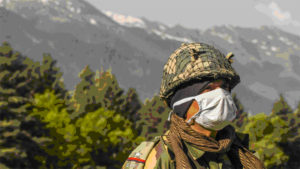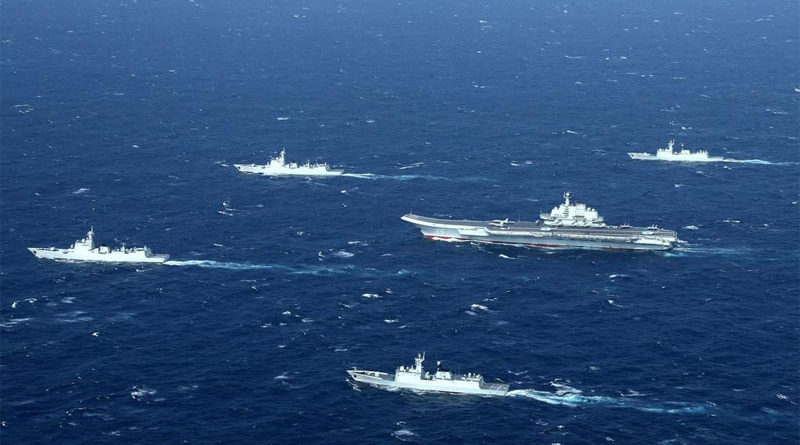China’s Aggression Backfires
by Jamie Seidel
27th Oct 2020
Duelling diplomats on Twitter. Fisticuffs in Fiji. “Xi thought” dominated policy. It’s all backfiring for Beijing, with previously neutral nations being driven into an alliance against it.
India has been ferocious in maintaining its “non aligned” status for decades. It refused to openly take sides in the Cold War between the USSR and US. It’s stridently remained independent in matters of defence and foreign policy ever since.
But that has suddenly changed.
Earlier this week, New Delhi dared Beijing’s wrath by inviting Canberra to join its high-level naval war-games with fellow democracies Tokyo and Washington.
Meanwhile, Beijing embarked on a charm offensive.
Its leaders have visited nine South East Asian nations. They’ve been talking up free-trade deals and foreign aid. But, notably, they stayed away from ASEAN’s current head, Vietnam, who recently formally protested China’s territorial intrusions and treatment of its fishers.
Analysts say this sudden attempt at nicety is unlikely to allay the fears of the 10-nation bloc. Beijing remains in direct dispute with five of them.
The Philippines, Malaysia, Brunei and Indonesia have the same fears as Vietnam when it comes to the South China Sea. And neighbouring nations such as India, Nepal and Bhutan are experiencing renewed pressure on their borders with China.
And that appears to be pushing many of them closer to the United States.
For its part, Beijing largely has itself to blame. Governments, diplomats and people around the world have stopped buying its stories.
Gunboat Diplomacy
Australian, Japanese and US naval forces are even now exercising in the South China Sea. The frigate HMAS Arunta joined the guided missile destroyers USS John S. McCain and JMSDF Kirisame in their fifth joint exercise of 2020.
“This activity is a valuable and important opportunity for all three nations,” HMAS Arunta‘s Commander Troy Duggan said in a statement. “Operating with our partners is essential for building and maintaining high levels of interoperability, and contributes to our shared commitment to the security, stability and prosperity of the Indo-Pacific region.”
Now Australian warships will be entering fresh waters following an invite from India.
A once-off visit in 2007 went no further after Beijing reacted with outrage.
Things have changed.
The Royal Australian Navy will be joining India in a large-scale, high-end military exercise called Malabar later this year.
In its announcement, New Delhi said the war-games were being conducted by nations that “support a free, open and inclusive Pacific and remain committed to a rules-based international order.”
Canberra declared the exercise “will bolster the ability of India, Australia, Japan and the United States to work together to uphold peace and stability across our region”.
It’s part of New Delhi’s revived diplomatic dialogue with the West following armed clashes on its remote Himalayan mountain border zone earlier this year. Now the long-stalled Quadrilateral Security Dialogue between India, Japan, the US and Australia is being revived with vigour.
At this point it’s just an idea – not an alliance. But the odds of it becoming formalised have just taken a dramatic leap forward.

HMAS Arunta conducts Officer of the Watch manoeuvres with KD Perak during a Passage Exercise with the Royal Malaysian Navy as part of an East Asia Deployment.
Driving Force
Xi Jinping has extolled his diplomats to “tell China’s story well”.
Communist Party leader Qi Yu added detail to this storytelling advice: “firmly hit back at those who defame socialism with Chinese characteristics and protect the nation’s political security. Increase your political determination, be brave enough to fight, be able to fight.”
The moral of the story: know your audience.
Neighbouring nations aren’t finding this message to be as appealing as it is to Mr Xi.
Shortly before Taiwan’s national holiday earlier this month, China’s embassy in India sent media there a warning not to call the island a country or President Tsai Ing-wen a president.
This was “so as not to send the wrong signals to the general public” – India’s public.
India’s media reacted with indignation. They did the exact opposite.
New Delhi was soon echoing Beijing’s repeated refrain: “don’t interfere in internal affairs”.
India’s Ministry of External Affairs declared its media was “free to report on any issue it deems fit”.
But Beijing’s fragility over Taiwan was soon to be on display.
The Chinese Communist Party failed to conquer the protectorate during the 1949 civil war. Ever since, it’s been trying to paint the Nationalist refuge – surrendered to Japan in the war of 1895 – as a ‘breakaway province’.
All it took for these decades-old tensions to erupt was a cake. A cake with Taiwan’s national flag on it. A cake celebrating Taiwan’s national day. In Fiji.
Chinese diplomats are said to have stormed into a celebration, sparking a scuffle that left one Taiwanese official in hospital.

Chinese officials in Fiji were said to be offended by a Taiwan flag cake.
Taiwanese Foreign Minister Joseph Wu condemned China’s “uncivilised wolf warriors”. It’s becoming a pervading opinion across the world.
Going It Alone
India’s unease has been growing for years.
China has been actively investing in port and military infrastructure in arch rival Pakistan. It’s been accused of ‘debt-trap diplomacy’ in the construction of a naval-grade port facility in neighbouring Sri Lanka. And Beijing has embarked on expensive building programs in Djibouti, a country in East Africa, and the Maldive Islands in South Asia.
It’s all part of President Xi’s headline ‘Belt and Road’ strategy to expand and secure trade routes with Europe and access to the critical oil resources of the Middle East.
Accompanying this investment have been regular Indian Ocean excursions by China’s rapidly expanding bluewater navy.
India had feared diplomatic and economic backlash from Beijing if it were to strengthen ties with the West. This is why Australia’s navy only joined in the Malabar war-games once: China reacted with outrage.
Which is why it took a surprise clash high in the Himalayas to spur New Delhi to act.
Dozens of Indian and Chinese soldiers died on a disputed series of ridges in the Ladakh region in May. At stake is a strategic high ground overlooking much of India’s northern borders with Kashmir and Pakistan.

An Indian soldier guards a highway as Indian army convoy makes way towards Leh, bordering China. Picture: Yawar Nazir/Getty Images.
Now the pervading attitude among India’s government appears to be that appeasement is no longer working. So they need a new strategy.
It’s just one of the more dramatic examples of a global rethink of Beijing’s motives.
Bulls In China’s Shop
A recent Pew survey, which encompassed 14 different countries, found China’s reputation has collapsed to a historic low. And a cacophony of crises is behind it.
At the UN, 39 nations issued a joint statement declaring their fears over cultural genocide of the ethnic Uighur Muslim minority in occupied Xinjiang. Some 70 years after the invasion of Tibet, concerns at the forced assimilation of this ancient culture are once again being expressed.
Sparking it all has been Beijing’s blatant disregard for the handover agreement it signed with Great Britain over the handover of Hong Kong. Now democracy advocates there – be they students or parliamentarians – are being detained.
Even Africa – the focus of significant investment from Beijing – has begun voicing discontent. Faulty equipment. Poor quality constructions. Discriminatory and racist behaviour. There is an emerging gulf between Beijing’s words and actions.
Kenya’s The Nation news service declared that “Kenya and the rest of Africa feel deeply betrayed by China.” That editorial has since been removed.
“The pandemic has been a wake-up call for many,” writes Backlash: How China’s Aggression Has Backfired author Helen Raleigh.
“Leaders and citizens around the world finally realised that a government that ruthlessly suppresses free press, freedom of expression and freedom of religion of its own people will inevitably bring harm outside its borders. Beijing has no one but itself to blame for its tarnished reputation and increasing international backlash.”
Hostage Diplomacy
At the heart of collapsing relations with China is its growing embrace of ‘hostage diplomacy’.
Its Communist Party-controlled courts allow foreign citizens to be held – without charge and minimal contact with family and consul officials – for many months.
It’s a power being used to express Beijing’s discontent with the international rule of law.
Canada has so far been a major target of this intimidation tactic.
Huawei executive Meng Wanzhou is fighting a US extradition request in Canada over allegations of breaching international trade embargoes. She has powerful friends.
Beijing retaliated by arresting two Canadians, Michael Spavor and Michael Kovrig, on allegations of spying. Toronto considers them to be hostages.
More than a year after the detentions, Toronto continues to displease Beijing. And attract new threats.
Last week, Canada was accused of supporting “violent criminals” by granting refugee status to fleeing pro-democracy protesters from Hong Kong.
“So if the Canadian side really cares about the stability and prosperity in Hong Kong, and really cares about the good health and safety of those 300,000 Canadian passport holders in Hong Kong, and the large number of Canadian companies operating in Hong Kong SAR, you should support those efforts to fight violent crimes, “said China’s ambassador to Canada, Cong Peiwu from a video in the Chinese Embassy.
When challenged about this being a threat, Beijing’s ambassador to Canada replied: “That is your interpretation”.
Canadian Prime Minister Justin Trudeau responded with outrage, accusing Beijing of “coercive diplomacy” and declaring that he would “stand up loudly and clearly for human rights”.
The embassy responded: “China firmly opposes Canada granting ‘political asylum’ to the violent criminals in Hong Kong. Canada should denounce ideological bias and stop meddling in China’s domestic affairs.”
International analysts are confounded by Beijing’s belligerence.
“Public challenges, like the one offered by (Cong), actually make it far less likely that Canada will do China’s bidding, whether the request is to return Ms Meng or to close our doors to asylum seekers from Hong Kong,” former Canadian ambassador to China David Mulroney said.
“(This) reminds us that Canadians who live and work in Hong Kong are as vulnerable to China’s hostage diplomacy as are Canadians in Beijing, Shanghai or any other mainland city”.
Reinforcing The Quad
The United States held its first-ever bilateral air, land and sea exercises with India in November. By July, the aircraft carrier USS Nimitz was also working with the Indian navy. Now the two nations are discussing military intelligence sharing agreements.
Similar negotiations are picking up pace with Japan and Australia under the Quadrilateral Security Dialogue framework.
“Its intention is clear – to solidify China’s neighbouring countries in a bid to balance and check China,” a commentary in the Communist Party-controlled Global Times newspaper said.
Foreign Minister Wang Yi criticised the idea of the Quad as evidence of an effort by Washington to establish an “Indo-Pacific NATO”. This would severely undermine regional security, he warned.
An earlier Global Times article stated the Quad negotiations were “aimed at China”. A more recent story declared Beijing was ‘prepared against military provocation from Australia’.
Now the Communist Party is again warning of war: “If indeed Australia participates in this year’s Malabar naval exercise, this will have a negative impact on peace and stability,” its mouthpiece declared.
“The formation of the military alliance in the Indian Ocean will inevitably stimulate other countries to take countermeasures. Chances for military confrontations will intensify.”
But New Delhi is no longer buying Beijing’s story.
“India needs to send out a message to China that it is looking for alternatives and that it has other friends and partners,” Observer Research Foundation analyst Professor Harsh Pant told the South China Morning Post.
“Each time the Quad is even mentioned, China goes ballistic. If it rattles China’s cage, why not rattle it well?”
Courtesy: Opera News/ m.whitsundaytimes.com.au

